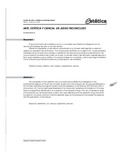Arte, estética y ciencia: un juego inconcluso
Fecha
2010-05-03Autor
Palabras Clave
Estética, Arte, Belleza, Subjetividad, CienciaAesthetics, Art, Beauty, Subjectivity, Science
Metadatos
Mostrar el registro completo del ítemResumen
El reconocimiento de la estética como un concepto que habilita la indagación en los asuntos primordiales del arte no ha sido sencillo.
Desde la Antigüedad, el arte estuvo subordinado a la mimesis, restringiendo la creación original y la expresión del sentimiento. Con la propuesta de Plotino en el siglo II d.C., el arte empieza
a liberarse de sus limitaciones morales y metafísicas. De esta forma se analiza la identificación de una concepción simbólica de lo bello en el arte, un estudio teórico del arte bello, lograda gracias a Kant, quien señalaba que lo estético no puede fundarse en conceptos, y de la que surge la estética como la filosofía que estudia la esencia y la percepción de la belleza.
Colecciones
Información Adicional
| Resumen en otro Idioma | The recognition of the aesthetic like a concept that enables the investigation in the fundamental subjects of the art has not been simple. From the Antiquity, the art was subordinated to the mimesis, restricting the original creation and the expression of the feeling. With Plotinus’s offer in 2nd century A.D., the art starts begin liberated of his moral and metaphysical limitations. In this way there is analyzed the identification of a symbolic of the beautiful thing in the art, a theoretical study of the beautiful art, achieved thanks to Kant, who was indicating that the aesthetic thing cannot be founded on concepts, and from that the aesthetic arise as the philosophy that studies the essence and the perception of the beauty. |
| Colación | 125-132 |
| Periodicidad | semestral |






